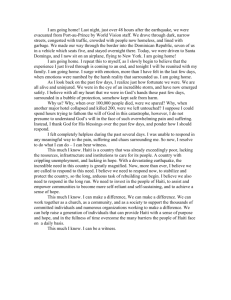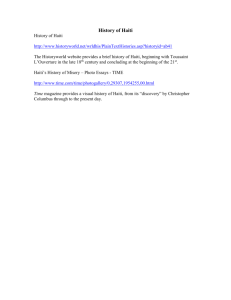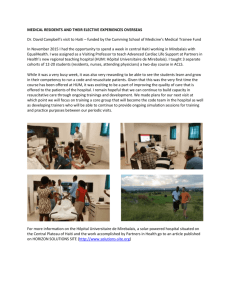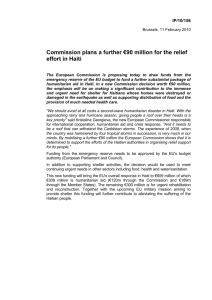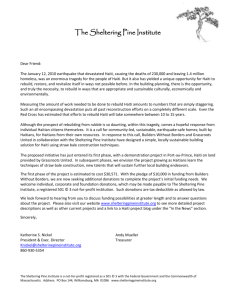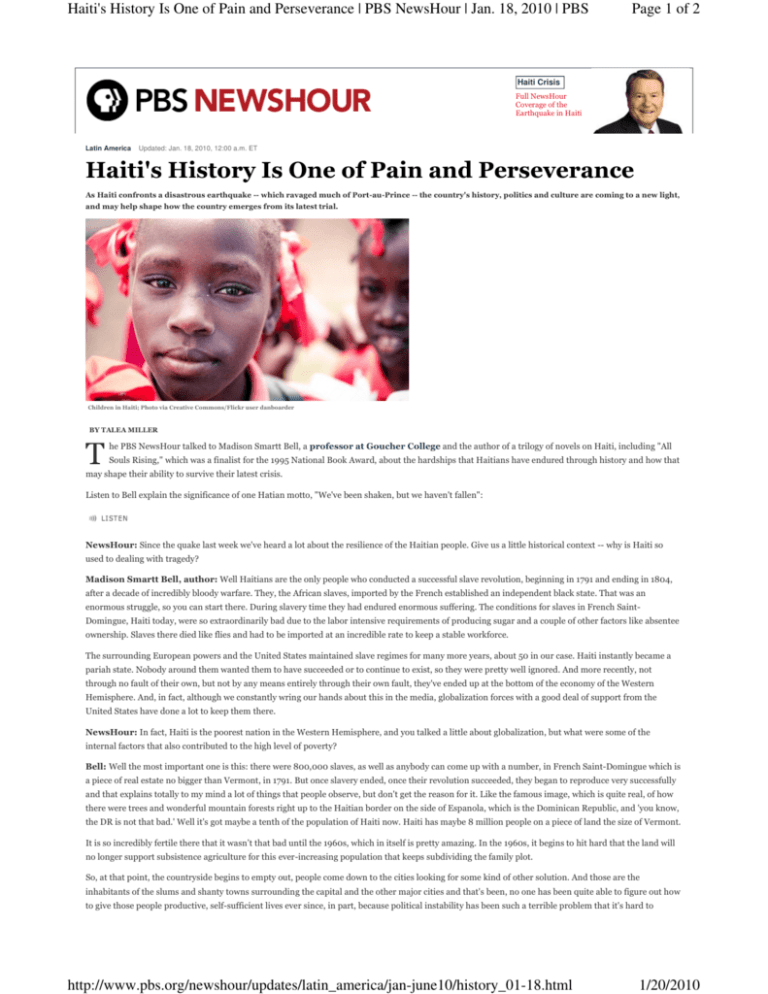
Haiti's History Is One of Pain and Perseverance | PBS NewsHour | Jan. 18, 2010 | PBS
Page 1 of 2
Haiti Crisis
Full NewsHour
Coverage of the
Earthquake in Haiti
Latin America
Updated: Jan. 18, 2010, 12:00 a.m. ET
Haiti's History Is One of Pain and Perseverance
As Haiti confronts a disastrous earthquake -- which ravaged much of Port-au-Prince -- the country's history, politics and culture are coming to a new light,
and may help shape how the country emerges from its latest trial.
Children in Haiti; Photo via Creative Commons/Flickr user danboarder
BY TALEA MILLER
T
he PBS NewsHour talked to Madison Smartt Bell, a professor at Goucher College and the author of a trilogy of novels on Haiti, including "All
Souls Rising," which was a finalist for the 1995 National Book Award, about the hardships that Haitians have endured through history and how that
may shape their ability to survive their latest crisis.
Listen to Bell explain the significance of one Hatian motto, "We've been shaken, but we haven't fallen":
NewsHour: Since the quake last week we've heard a lot about the resilience of the Haitian people. Give us a little historical context -- why is Haiti so
used to dealing with tragedy?
Madison Smartt Bell, author: Well Haitians are the only people who conducted a successful slave revolution, beginning in 1791 and ending in 1804,
after a decade of incredibly bloody warfare. They, the African slaves, imported by the French established an independent black state. That was an
enormous struggle, so you can start there. During slavery time they had endured enormous suffering. The conditions for slaves in French SaintDomingue, Haiti today, were so extraordinarily bad due to the labor intensive requirements of producing sugar and a couple of other factors like absentee
ownership. Slaves there died like flies and had to be imported at an incredible rate to keep a stable workforce.
The surrounding European powers and the United States maintained slave regimes for many more years, about 50 in our case. Haiti instantly became a
pariah state. Nobody around them wanted them to have succeeded or to continue to exist, so they were pretty well ignored. And more recently, not
through no fault of their own, but not by any means entirely through their own fault, they've ended up at the bottom of the economy of the Western
Hemisphere. And, in fact, although we constantly wring our hands about this in the media, globalization forces with a good deal of support from the
United States have done a lot to keep them there.
NewsHour: In fact, Haiti is the poorest nation in the Western Hemisphere, and you talked a little about globalization, but what were some of the
internal factors that also contributed to the high level of poverty?
Bell: Well the most important one is this: there were 800,000 slaves, as well as anybody can come up with a number, in French Saint-Domingue which is
a piece of real estate no bigger than Vermont, in 1791. But once slavery ended, once their revolution succeeded, they began to reproduce very successfully
and that explains totally to my mind a lot of things that people observe, but don't get the reason for it. Like the famous image, which is quite real, of how
there were trees and wonderful mountain forests right up to the Haitian border on the side of Espanola, which is the Dominican Republic, and 'you know,
the DR is not that bad.' Well it's got maybe a tenth of the population of Haiti now. Haiti has maybe 8 million people on a piece of land the size of Vermont.
It is so incredibly fertile there that it wasn’t that bad until the 1960s, which in itself is pretty amazing. In the 1960s, it begins to hit hard that the land will
no longer support subsistence agriculture for this ever-increasing population that keeps subdividing the family plot.
So, at that point, the countryside begins to empty out, people come down to the cities looking for some kind of other solution. And those are the
inhabitants of the slums and shanty towns surrounding the capital and the other major cities and that's been, no one has been quite able to figure out how
to give those people productive, self-sufficient lives ever since, in part, because political instability has been such a terrible problem that it's hard to
http://www.pbs.org/newshour/updates/latin_america/jan-june10/history_01-18.html
1/20/2010
Haiti's History Is One of Pain and Perseverance | PBS NewsHour | Jan. 18, 2010 | PBS
Page 2 of 2
concentrate on that.
NewsHour: How well was the Haitian government functioning before the earthquake?
Bell: The past couple years when the [Rene] Preval administration, with the assistance of a very, very effective U.N. mission that's mainly staffed with
third world soldiers who understand where they are better than people who were sent there before, had done a tremendous amount to improve security,
so much so that the State Department which has had very dire warnings about going to Haiti since 1995, when I first started going there they kind of took
the warning completely off for the first time in 15, 20 years. That is an amazing development.
This happened around the same time that [President Bill] Clinton, as special envoy, had a big conference down there for all of these people who were
going to start up again with those types of light industry projects that Haiti used to have.
I have to say they are very, very poorly paid, they're exploitative, but it's better than nothing and it’s a start. We've got to hope that all of that won't go
away, obviously it's not going to start on schedule because of the infrastructure as it was that they would have relied on is absolutely gone now, but I do
hope there will be some sustainable economic development there. There was a good start. Last year was the best year Haiti had in a long time and there is
no reason for that all to go away now.
NewsHour: What kind of involvement has the U.S. had with Haiti in the past?
Bell: We worried, not without reason, that this was going to be a U boat base for the Germans in World War I. The Marines came in, occupied Haiti for 19
years, I think. There was a lot of static about whether these Marines were Southerners—well guess what in 1914 it doesn't matter we were all racist in this
country and extremely paternalistic.
They had forced labor for Haitians. They did all these projects and some of the roads they built are still there or were until recently, but Haitians hated
that occupation they really, really hated it. Finally it ended and then there were another several rounds of instability…
During the Clinton administration's intervention (in 1994), with one hand we were putting back the elected government, [Jean-Bertrand] Aristide, and
with the other there was an argument that the death squad organization run by the people who had done the military coup against Aristide was actually
"loyal opposition" and should be treated as such. That has continued until this day.
A similar left hand doesn’t know what the right hand is doing and vice versa was very much involved in bringing down Aristide in 2004. Not that most of
the pro-democracy forces in Haiti didn't also want him gone at that point, nevertheless our right wing is persistently, and to my mind plausibly, accused of
having had a direct hand in encouraging, arming and facilitating the development of this contra-style little force of ex-Haitian army personnel who when
they saw their opportunity in 2004 came across the border and created what they called a revolution, that lasted just long enough to force Aristide out of
the country, and then what do you know its occupied briefly by American Marines.
I would really like to think that this time around we can give them what they need, and not what they don't need. What they need is help rebuilding their
infrastructure and maintaining security ... not saying you have to have democracy on our model.
NewsHour: How do you think this chapter in history, this earthquake, will factor into Haiti's future?
Bell: This may not be a very popular thing to say, but I have a lot of friends, people I really love in Port-au-Prince, so far most of them are alive, some I
haven't heard from. I go there mostly to see those people. I have otherwise tended to think of Port-au-Prince as a death trap, not only literally, as it turned
out to be but in every other kind of way.
Of course most of the culture is there, the political life is there, a lot of good things are there, it's the big hub of all the energy, but it's a mess. And now it's
gone … they can do something else there. And I think in the doing of that, some of the problems of the political culture that really do hold Haiti back can
also be reformed.
Copyright © 1996- 2010 MacNeil/Lehrer Productions. All Rights Reserved.
Support the kind of journalism done by the NewsHour...Become a member of your local PBS station.
http://www.pbs.org/newshour/updates/latin_america/jan-june10/history_01-18.html
1/20/2010

